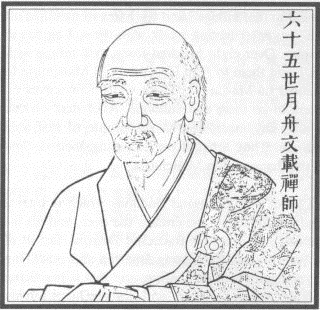
師生蔚州 廣寧王氏。因閱萬松拈古。至
歸來背父之語。面牆久之。忽有省。參
無方便問。承師有言。當人一著。非假
外來。直須向自己胸襟迸出。語未絕。
方劈面便掌。師驚悟。偈曰。劈面攔腮
。電光石火。立命安身絕影蹤。臘月蓮
花開朵朵。正德改元。奉敕住少林。參
徒雲集。說法無虛日。嘉靖甲申。師年
七十。餘遂結廬投老。於三十六峰。
贊曰:
青天霹靂 一掌攔腮
燈籠發笑 露柱懷胎
雲清日杲 火猛蓮開
心光透處 海竭山摧
宣化偈曰:
晴天霹靂斷疑根 一掌攔腮了死生
燈籠發笑未曾有 露柱懷胎少日星
火猛蓮開絕方便 水深舟行文載擎
心光透處離罣礙 海竭山摧達廣寧
白話解:
這位禪師是曹洞宗六十五世,名字叫月舟文載。「師生蔚州廣寧王氏」:他是蔚州廣寧縣人,俗家姓王。他很年輕就落髮出家。有一次,他閉關修行,「因閱萬松拈古,至歸來背父語」:他看到行秀(萬松)禪師「歸來背父」這句話時,心中有所感觸。因此「面牆久之」:他面對著牆入定很久,在那兒參考這句話。這「歸來背父」:是萬松老人說他自己出去學道,等回到家後,父親已經不在了,所以是違背父親。又可以說,是我違背父親出去學道,現在回來見到了我的父親。也可以說,是當初父親不許我修道,而我自己到外面去,把世俗的父親違背了。這句話有很多意思,所以文載禪師就在那兒面牆研究這句話。久之,「忽有省」:他忽然間就明白了,開悟了,心光透了。於是他「參無方便問」:他去參無方可從禪師就說了,「承師有言」:仰承老師你有句話說,「當人一著,非假外來」:當人就是修道人。說修道人你這個心地法門,要從你心地上下功夫,不是從外邊得到的。你「直須向自己胸襟迸出」:迸出,就是本來沒有什麼,忽然間就迸出,就開悟了。所以,這要在你自己本性,從心地那個地方迸出。
→待續
|
|
這個心地法門,要向你心地上用功夫,
不是從外邊得到的。
The mind ground Dharma door is something one must apply
effort on at the mind ground; it's not something one can get from outside.
The Master was born in Guang Ning of Wei District to the Wong family. Because he read Patriarch Wan Sung's sentence, "I came back to find my father gone," he sat facing the wall for a long time and then had a sudden enlightenment. Then he went to study with Patriarch Wu Fang and asked the Patriarch this question: "You said a sentence once: 'The essence of cultivation doesn't come from outside. It should well forth from your own bosom.'" Before he finished asking, Patriarch Fang slapped him on the face. The Master was shocked and attained an awakening. He spoke this verse:
The slap on my face
Like lightning, like a spark.
The place where my body and life had been
disappeared without a trace.
The lotus flowers bloomed in the dead of winter.
In the beginning of the Jeng De reign period, he responded to the Emperor's edict and went to Shao Lin Monastery to be Abbot. People gathered like clouds to study with him. A day never passed when he did not speak the Dharma. In the year of Jia Shen of the Jia Jing reign period, when the Master was over seventy years old, he made a hut and retired to the Thirty-Sixth Peak to pass his last days.
A verse in praise says:
Out of the blue a thunderbolt pealed:
A slap on the cheek!
The lanterns laughed.
A bare-trunked tree sprouted anew.
The clouds cleared and the sun blazed down.
Within the fire, lotuses abounded.
Where the mind's light penetrates forth,
The seas dry up and the mountains collapse.
Another verse says:
Out of the blue, a thunderbolt severed the root of doubts.
A slap on the cheek ended birth and death.
The lanterns laughed--an unprecedented event!
For a barren tree to sprout again is as rare as a sun among
stars.
In a blazing fire, lotuses bloomed--no expedient way to
explain it.
The boat passed through deep waters carrying Wen Zai.
Where the mind's light penetrates, hindrances are left behind.
The seas dry up, the mountains topple, all the way to Guang
Ning.
Commentary:
This Dhyana Master is the 65th Patriarch of the Tsao Dong School. His name is Yue Zhou Wen Zai. The Master was born in Guang Ning of Wei District to the Wong Family. He came from Guang Ning County of the Wei District and his lay surname was Wang. He shaved his head and left the home-life when he was young. One time when he was cultivating in seclusion , because he read Patriarch Wan Sung's sentence; "I came back to find my father gone"--when he saw Zing Ziu's (Patriarch Wan Sung's other name) line: "I came back..." something struck his mind. And so he sat facing the wall for a long time. He sat there facing the wall for a long time in samadhi contemplating this line.
This line "I came back to find my father gone" is Elder Wan Sung referring to himself. He went out to cultivate the Way and when he returned, his father was gone. This line can also be explained that he went out to study the Way against his father's wishes, and now that he's come back, he encounters his father whom he had gone against. Another way to explain it is that in the beginning, his father did not allow him to cultivate the Way, but he left anyway, and so he went against his worldly father. There are many ways to interprete this line. And so Master Wen Zai sat there facing the wall, studying this line and then had a sudden enlightenment. He suddenly understood and became enlightened: the light of his mind penetrated. Then he went to study with Patriarch Wu Fang and asked the Patriarch this question. You said a sentence once: "The essence of cultivation doesn't come from outside." The mind ground Dharma door is something you must apply effort to on the mind ground; it's not something you can get from outside. It should well forth from your own bosom. "Welling forth" means that basically there isn't anything, and suddenly it bursts out and you become enlightened. It has to come forth from your own nature: the place of the mind ground.
→To be continued
|